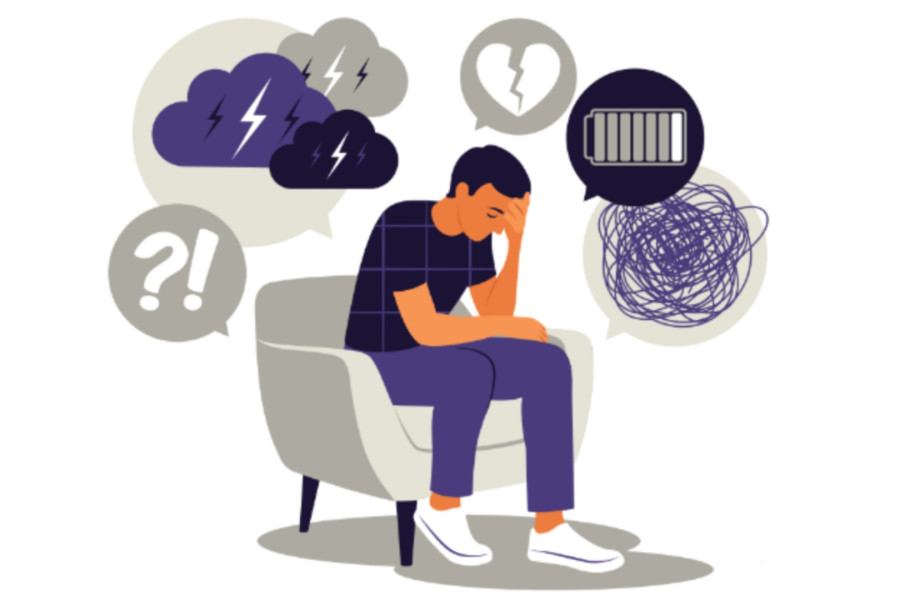Culture & Lifestyle
Deconstructing myths on depression
Depression is often misunderstood as sadness, but it’s a complex condition with physical, psychological, and social components.
Sujina Manandhar
Depression is probably the first word that comes to mind for most people when they think about mental health conditions. It is the one thing people assume when they hear someone is going through a rough phase in their mental health or seeing a mental health professional.
Nowadays, people seem to freely label any mental disorder as depression. But what does the word actually mean? Are these people correct, or are they wrongfully assuming any of the vast array of mental health conditions as depression?
Although most people know about it or have at least heard the term, it is associated with many myths and misconceptions.
Let us deconstruct depression by discussing what it is not.
It’s not just about feeling sad
One of the biggest misconceptions is that depression is the same as being sad. In reality, being sad and depressed are two different things. Even though consistent low mood or being unable to enjoy the things that once brought happiness are two of the major symptoms of depression, individuals with depression also experience anxiety, tension, emptiness, anger, irritation, or apathy.
It’s not solely about emotions
Mental illnesses, including depression, are not just the result of emotions. They occur from a complex interplay of physical, psychological, and social aspects of a person’s life and the symptoms present in these three domains too. On a physical level, depression might present itself as experiencing low levels of energy or fatigue, trouble sleeping or oversleeping, loss of appetite or overeating, reduced interest in sex, and constant aches and pains in the body, among other things. Psychologically, apart from the emotional impact, depression may manifest as a lack of motivation, an inability to concentrate, feeling hopeless, angry, irritable, anxious, or thoughts of self-harm or suicide. People might also lose interest in socialising, want to isolate themselves or feel easily irritable with others.
It’s not about having a bad day or two
Everyone has occasional bad days, but that doesn’t equate to depression. It takes more than just a few days of sadness; symptoms must persist for at least two weeks to be considered depression, and it can last for years if left untreated.
It certainly isn’t something one can just snap out of
Telling someone to “stop stressing” or “don’t think about it” oversimplifies the experience of depression. It’s not something one can just stop being. It is a complex and difficult experience for the person going through it. People do not suffer from depression willingly or because they are weak, and they surely can’t make it disappear through sheer will.
It affects not only adults
Although less common in children and adolescents, depression can occur in these age groups. They might show the symptoms slightly differently and struggle to communicate their feelings, but their experience with depression can be just as severe as that of adults.
Seeking help
Depression is one of the most common mental health conditions out there, but just because a lot of people have depression does not make it something that one should accept as normal. While activities like going for a walk or reading a book may offer some relief, they are certainly not enough if the symptoms have been present for a long time or become severe to the point one has thoughts of self-harm or suicide. Seeking professional help is crucial. Depending on severity, psychotherapy, medication, or a combination of both can be effective.
Medication and therapy
There is a popular belief that depression is a lifelong disease and once you start taking medication for it, you have to continue it for your whole life. That isn’t true at all. Depression can last from weeks to years, depending on the individual, but it certainly isn’t a lifelong condition. Its medication should be taken under a certified psychiatrist’s supervision but doesn’t necessarily require lifelong use. Even when you are discontinuing it or changing its dosage, it should be done only after consulting your psychiatrist.
Not all cases of depression require medication. Cognitive Behavioral Therapy (CBT) is a form of therapy that has been found highly successful in aiding individuals experiencing depression. It goes beyond talking and helps individuals recognise and address thought patterns, emotional reactions, and behaviours to improve daily functioning. It’s often most effective when combined with antidepressant medication.
Each person’s journey with depression is unique, but everyone deserves to be heard and helped. If you or someone you know is on this journey, please reach out to a mental health professional.




 9.89°C Kathmandu
9.89°C Kathmandu

.jpg&w=200&height=120)













